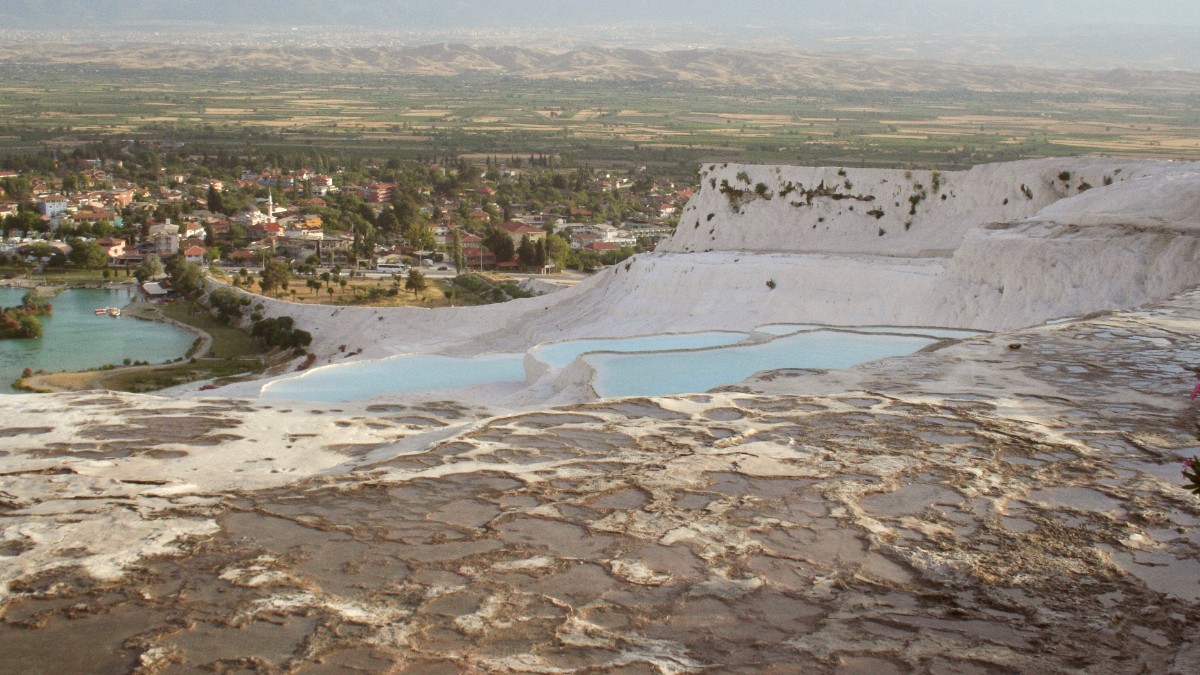
Aegean Coast, Turkey
Spring (April-May): Temperatures are mild, typically ranging from 15-25°C (59-77°F). Precipitation is low, creating comfortable conditions for extensive exploration of both the travertines and Hierapolis. The landscape often presents lush and green after winter rains.
Autumn (September-October): Temperatures become pleasant again, averaging 18-28°C (64-82°F). Crowds begin to thin compared to summer peak, and the weather remains comfortable for outdoor activities. The landscape retains some of its summer dryness.
Summer heat can be extreme. Drink water frequently, wear a wide-brimmed hat, and seek shade during midday hours. Plan to visit the travertines and Hierapolis early in the morning or late in the afternoon to avoid the most intense heat.
The travertine surfaces become slippery when wet from the flowing thermal water. Walk with care, especially in damp areas, to prevent falls. Winter brings more rain. A waterproof jacket and sturdy, non-slip footwear are recommended.
June-August
Long daylight hours; thermal pools refreshing in heat.
Very hot temperatures; large crowds; higher prices.
April-May, Sep-Oct
Comfortable temperatures; fewer crowds; good balance.
Cooler evenings; some seasonal tours may not operate frequently.
November-March
Very few crowds; lowest prices; unique winter beauty.
Cold temperatures; higher chance of rain; reduced hours for some facilities.
Spring and Autumn (April-May, September-October) offer the most comfortable weather for extensive walking and exploring the ancient city. The milder temperatures allow for longer periods outdoors. During summer, plan your visit for early morning or late afternoon to avoid the peak heat and direct sun exposure.
Enjoying the thermal pools is possible year-round. They feel especially refreshing in the summer heat and give a welcome warmth during cooler months. It is best enjoyed from spring to autumn, when skies are generally clear and winds are favorable. Operators typically monitor weather closely for safety.
Best in Spring/Autumn for comfortable walking.
Refreshing in summer, inviting in winter.
Best from Spring to Autumn with clear skies.
Morning and late afternoon for soft light.
Low season (winter) offers serenity and lowest prices.
Requirements vary significantly based on your nationality.
Citizens of many countries, including the United States, Canada, Australia, and most EU member states, are eligible for an e-Visa. This process is convenient and handled online via the official Turkish e-Visa website (IVisa or VisaHQ). The e-Visa is typically valid for 90 days within a 180-day period. Some countries enjoy visa-exempt status for specific periods. For others, an embassy or consulate visa application is necessary.
Your passport must be valid for at least six months beyond your intended stay. For e-Visa holders, a printed copy of your e-Visa confirmation is recommended. Immigration officials may request proof of sufficient funds and a return or onward ticket to show intent to leave Turkey within the permitted stay.
For delayed or canceled flights, services like AirHelp might assist passengers in receiving compensation up to €600.
Costs vary significantly depending on your travel style.
The official currency of Turkey is the Turkish Lira (TRY), symbol ₺. ATMs are widely available in Denizli city and Pamukkale village, offering a convenient way to withdraw local currency. Major credit cards, including Visa and Mastercard, are accepted at most hotels, larger restaurants, and shops.
Carrying some cash is advisable for smaller purchases, street food vendors, and dolmuş (minibus) fares, as not all small establishments accept cards. Exchange offices, known as Döviz Bürosu, are available in Denizli. You can also exchange currency at banks, though exchange offices often offer better rates. Avoid exchanging large sums at airports, as rates there are typically less favorable.
Expect to spend ₺700 - ₺1,200 TRY (approx. $22 - $38 USD) per day. This budget works for hostel dorms, local eateries, and minibus travel.
Accommodation: ₺250-₺400 (hostel/guesthouse)
Meals: ₺200-₺350 (street food/local eateries)
Plan for ₺1,500 - ₺3,000 TRY (approx. $47 - $95 USD) per day. This covers a mid-range hotel, dining at local restaurants, and occasional taxis.
Accommodation: ₺600-₺1500 (mid-range hotel)
Meals: ₺400-₺800 (local restaurants/cafes)
Anticipate ₺3,500+ TRY (approx. $110+ USD) per day. This budget allows high-end hotels, fine dining, and private transfers.
Accommodation: ₺1800+ (high-end hotel/spa)
Meals: ₺1000+ (fine dining/international)
| Category | Range (TRY) | Notes |
|---|---|---|
| Hostel/Guesthouse | ₺250-₺800 per night | Budget-friendly accommodation |
| Mid-range Hotel | ₺800-₺2000 per night | Comfort with private facilities |
| Pamukkale/Hierapolis Entrance | ₺700-₺900 | Access to both sites |
Prepare for potential health concerns and understand local safety practices.
Ensure all routine vaccinations are up-to-date (MMR, DTP, Polio, Flu).
Hepatitis A, Hepatitis B (for prolonged stay), Typhoid (for adventurous eaters).
Drink Bottled water, avoid ice, eat well-cooked food. Carry Anti-diarrhea medication.
Pamukkale's intense sun, especially in summer, creates a significant risk of sunburn and dehydration. Apply High SPF sunscreen regularly. A Mineral sunscreen SPF 50 is effective. Wear Wide-brimmed hats and Sunglasses. Drink plenty of bottled water.
The travertine terraces are uneven and slippery when wet. Walk slowly and carefully on designated barefoot paths. Some areas may have sharper edges. Exercise caution to avoid cuts or sprains.
For overall health, consider a Travel first aid kit.
Image of a basic Travel first aid kit.
Denizli city has public and private hospitals. Private hospitals offer modern facilities and often English-speaking staff.
Widely available in Denizli and Pamukkale village. Pharmacists provide advice for minor ailments, many speak English.
Choose busy restaurants and street food vendors with visible hygiene practices. High customer turnover indicates fresh ingredients.
Pamukkale and Denizli are generally safe destinations for tourists. Petty crime, like pickpocketing or bag snatching, can occur in crowded tourist areas, bus stations, or busy markets. Violent crime against tourists is rare.
In an emergency, Turkey has an unified emergency number. Keep the contact details of your home country's embassy or consulate in Turkey readily available. This information is found on your government's foreign travel advisory website. In case of lost passports or serious emergencies, contact them immediately.
Dial 112 for Police, Ambulance, and Fire services.
Contact your home country's mission in Turkey for serious issues or lost passports.
Provide emergency contact information for next-of-kin to your travel companions.